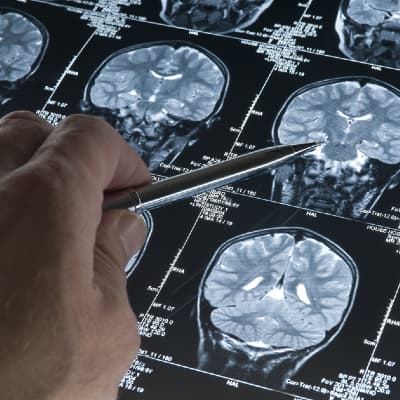A brain aneurysm occurs when a weak spot in a blood vessel in the brain fills with blood (enlarges) and then bulges or balloons out.
If the brain aneurysm (also called a cerebral aneurysm) ruptures, it can cause a stroke.
Brain Aneurysm Signs and Symptoms
If you have a small brain aneurysm that is not leaking, you may not have any symptoms.
Brain aneurysm symptoms of a rupture include the following:
- A sudden headache, often described as "the worst headache of your life"
- Double vision
- Stiff neck
- Pain behind or above the eye
- Vomiting or nausea
- Numbness or weakness on one side of your body
Call 911 immediately if you or your loved one experiences any of the above brain aneurysm symptoms — particularly if they come on suddenly.
Brain Aneurysm Treatment at Rush
One of the biggest decisions you and your care team will make is how to treat a brain aneurysm that has not ruptured.
Deciding How to Treat Your Aneurysm
- Your treatment options for an unruptured aneurysm will depend on your age and general health and the size, shape and location of your brain aneurysm.
- Your neurosurgeon will discuss your options with you based on the above, plus how much anxiety you feel about an unruptured brain aneurysm.
- Your options for treating your unruptured aneurysm include the following:
- Clipping (open brain surgery): a procedure to find the aneurysm and place a clip on it to stop blood flow into the aneurysm.
- Coiling, or embolization (minimally invasive, cerebrovascular surgery): a catheter inserted into an artery is threaded to the brain. Surgeons use the catheter to place coils inside the aneurysm to seal off the blood flow.
- No treatment, but with continued monitoring of your symptoms and growth of the aneurysm
Risk Factors for a Brain Aneurysm Rupture
No one can know whether an aneurysm will rupture. We do know, however, factors that affect whether a brain aneurysm will rupture:
- Brain aneurysm size and shape
- If you smoke
- If you have high blood pressure
- If someone in your family had a brain aneurysm that ruptured
Rush Excellence in Brain Aneurysm Care
- Brain aneurysm and AVM expertise: Rush neurosurgeons typically perform more than 700 cerebrovascular procedures each year. These include more than 450 minimally invasive procedures each year. These surgeries include procedures for brain aneurysms and arteriovenous malformation, or AVM.
- Multiple options for surgery: Many Rush neurosurgeons have the ability to perform either open surgeries or go through the blood vessels (known as endovascularly), or perform the surgery while you are awake or under general anesthesia. This flexibility means they can tailor the procedure to fit your situation.
- Minimally invasive option for wide-necked aneurysms: Rush University Medical Center offers the Woven EndoBridge (WEB) Aneurysm Embolization System. The WEB device is a minimally invasive option for treating wide-neck aneurysms in areas where an artery branches into two arteries. Before, these types of aneurysms usually required open-brain surgery to clip the aneurysm.
- Neurosurgery in the western suburbs: Rush offers neurosurgery in Oak Brook and Aurora/Fox Valley, in addition to Chicago. Neurosurgeons across the Rush System are available to discuss with you whether your brain aneurysm or AVM needs surgery.
- Stroke care expertise: Brain aneurysms or AVMs that rupture can cause a hemorrhagic stroke. Rush has been recognized as providing emergency stroke care that is among the best in the country. Rush's stroke services include follow-up stroke care through rehabilitation and prevention of future strokes.
- Nationally recognized neurosciences: Neurology and neurosurgery at Rush University Medical Center are consistently ranked among the nation's best by U.S. News & World Report.


